Survey: Many Rhode Island Public School Students Don’t Feel Ready for College
Annual SurveyWorks results show more conversations about life after graduation among students of color.

Get stories like these delivered straight to your inbox. Sign up for The 74 Newsletter
PROVIDENCE — Less than half of Rhode Island students said they felt their education was preparing them for college or a career when asked by the Department of Education in a recent survey.
Only 17% of students between grades three and five said they talked about jobs and careers or college in class frequently or almost always in the Department of Education’s 2023 SurveyWorks questionnaire. That percentage jumped to 35% for those between grades six and 12.
State officials revealed the survey results at a ceremony in the Sgt. Cornell Young, Jr., and Charlotte Woods Elementary School Tuesday morning. The annual survey queries parents, educators, and students about their educational experiences to determine how to adjust plans moving forward. Rhode Island Department of Education spokesman Victor Morente said in an email the data was first collected during the 2016-2017 school year.
State officials said they saw the students’ willingness to participate and give voice to their concerns as a positive outcome.
“They’re thinking about what they are going to need for their future,” Rhode Island Commissioner of Education Angélica Infante-Green said, in comments to the press after the results were released.
When divided by race, among students in grades three to five, 19% of white students said they talked about college and careers frequently or almost always. That is significantly less than students of color — 26% of American Indian respondents said they talked often about the future while 31% of Black students, 30% of Latino, 32% of Native Hawaiian and Pacific Islanders, and 19% of Asian respondents said they did so.
The data was divided by linguistic groups for those in grades six to 12. Those who spoke Spanish at home were most likely to feel they were being prepared, with 40% saying they spoke about college and careers in class almost always or frequently. Haitian Creole and Italian speakers responded positively 38% of the time, Portuguese and Khmer 36%.
Those who spoke English at home said they talked about the future almost always or frequently 33% of the time. Only 27% of Chinese speakers said they spoke of the future almost always or frequently.
“This is a work in progress,” Gov. Dan McKee said. “I don’t think there’s anything alarming at all.”
Officials focused on the high number of responses, 122,672 statewide, representing about 93% of all public school students in the state, in remarks to the 200 or so students, administration, and faculty at the school.
Young and Woods Elementary saw the highest increase in response rates from families — meaning parents and guardians — in Providence. That 17 point increase, from 30% in 2022 to 47% in 2023, was why the school was selected for the announcement.
“Your families did a marvelous job in filling out the surveys,” Lt. Gov. Sabina Matos told the students at the ceremony in English and Spanish.
Providence saw the highest rate for family engagement in the state, with 30% responding compared to the state average 25%.
The top school in the state for family participation was Wawaloam Elementary School, in Exeter, at 98%. Other top performers included: Hope Valley Elementary School, in Hopkinton, at 91% Greystone School, in North Providence; 90%; Capt. E. Harold Hunt Elementary School, in Central Falls, at 89%; and 85% at the Agnes E. Little Elementary School in Pawtucket.
Social and emotional learning sees high approval
Families overwhelmingly approved of the social and emotional learning initiatives at schools statewide, with 70% responding favorably. That held true across racial groups with no category going under 69%.
Among students in grade three to five, 64% of students held favorable opinions of social and emotional learning at their schools and 52% of students grades six to 12 responded favorably.
Staff had the lowest approval ratings, with 48% of teachers answering favorably on questions related to social and emotional learning and 44% of support staff responding favorably.
“Social emotional learning is a critical component to K-12 education,” Stephane DeSilva Mandeville, communications director for the National Education Association of Rhode Island, said when asked for comment. “We know the pandemic had an impact on students’ coping skills and how they interact, and the Surveyworks results demonstrate a need for more meaningful skill-building at the district level.
“The mental and behavioral health of our students — and educational staff — is a priority for NEARI. We support an increased focus on services around SEL and welcome continued coordination with the State and LEAs.”
Providence School’s Superintendent Javier Montañez said the hard work of reaching out to families paid off and now, the district can figure out how to better serve them.
“I am so proud of all the hard work our Providence community has put in to improve student outcomes in our schools,” Montañez said. “Their hard work is paying off.”
Rhode Island Current is part of States Newsroom, a network of news bureaus supported by grants and a coalition of donors as a 501c(3) public charity. Rhode Island Current maintains editorial independence. Contact Editor Janine L. Weisman for questions: info@rhodeislandcurrent.com. Follow Rhode Island Current on Facebook and Twitter.
Get stories like these delivered straight to your inbox. Sign up for The 74 Newsletter

;)
